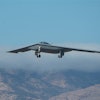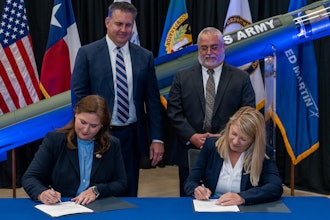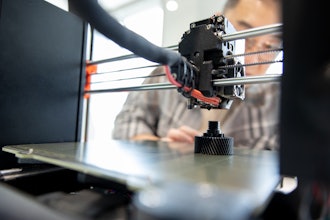A scientist and his wife who both once worked at Los Alamos National Laboratory were arrested Friday after an FBI sting operation and charged with conspiring to help develop a nuclear weapon for Venezuela.
After their arrest, the two appeared in federal court in Albuquerque, N.M.
They were accused of dealing with an FBI undercover agent posing as a Venezuelan agent. The government did not allege that Venezuela or anyone working for it sought U.S. secrets.
The pair were indicted for allegedly communicating classified nuclear weapons data to a person they believed to be a Venezuelan government official.
Accused in a 22-count indictment are Pedro Leonardo Mascheroni, 75, a naturalized U.S. citizen from Argentina, and Marjorie Roxby Mascheroni, 67, a U.S. citizen. Both were formerly contract employees at Los Alamos.
Pedro Mascheroni was held pending a court hearing Monday morning. His wife was released under strict conditions.
According to the indictment, Pedro Mascheroni told an undercover agent he could help Venezuela develop a nuclear bomb within 10 years and that under his program, Venezuela would use a secret, underground nuclear reactor to produce and enrich plutonium, and an open, aboveground reactor to produce nuclear energy.
In July 2008, the FBI agent provided Mascheroni with 12 questions purportedly from Venezuelan military and scientific personnel.
According to the criminal charges, Mascheroni delivered to a post office box in November 2008 a disk with a coded 132-page document on it that contained "restricted data" related to nuclear weapons. Written by Mascheroni and edited by his wife, the document was entitled "A Deterrence Program for Venezuela" and it laid out Mascheroni's nuclear weapons development program for Venezuela.
Mascheroni stated that the information he was providing was worth millions of dollars, and that his fee for producing the document was $793,000, the indictment alleges.
Earlier in the investigation, Mascheroni allegedly asked the FBI agent about obtaining Venezuelan citizenship.
He told the undercover agent he should be addressed as "Luke," and that he would set up an e-mail account solely to communicate with the undercover agent, according to the indictment.
Mascheroni used the account to communicate with the agent and to arrange for deliveries of materials at the post office box used as a dead-drop location, authorities say.
In June 2009, Mascheroni received another list of questions, again purportedly from Venezuelan officials, and $20,000 in cash from the FBI agent as a first payment.
The following month, Mascheroni delivered to the dead drop location a disk that contained a 39-page document with answers to the questions. The document was allegedly written by Mascheroni, edited by his wife, and contained "Restricted Data" related to nuclear weapons.
Mascheroni allegedly wrote that the information he had provided was classified and was based on his knowledge of U.S. nuclear tests that he had learned while working at Los Alamos. But the government said Mascheroni also wrote that he would state the document was based on open information found on the Internet if "our relationship/alliance does not work."
If convicted, Mascheroni and his wife face up to life in prison.
In an interview last year with The Associated Press, Mascheroni said that the U.S. government was wrongly targeting him. His home was searched last October and the FBI seized computers, letters, photographs, books and cell phones.
At the time, Mascheroni said he had approached Venezuela after the United States rejected his theories that a hydrogen-fluoride laser could produce nuclear energy.
Mascheroni has said he thought the Venezuelan government wanted him to produce a study on how to build a nuclear weapons program. In return, he asked for $800,000, which he said he planned to use for his scientific research on nuclear fusion in hopes of persuading Congress to take a look at his theories.
Mascheroni has said that in 2008 he gave a computer disk with unclassified information to a man claiming to represent Venezuela. He was paid $20,000, but never spent the money and it was recovered by the FBI during their search.
The $20,000 in cash was left in a drop box at the Albuquerque airport, Mascheroni told AP.
In July 2008, Mascheroni said he received a formal request via e-mail from his Venezuelan contact to write a study for how to build a nuclear weapons program.
Mascheroni told AP that he finished the study in November 2008 and, following directions, placed a CD containing only unclassified information available on the Internet — which he already had provided to congressional staffers — inside a post office box at the Albuquerque airport.
Later, he told AP, he received an e-mail telling him to return to the same post office box where he found a note that said there was $20,000 in $100 bills inside an envelope.
___
Associated Press correspondent Barry Massey in Santa Fe, N.M., contributed to this report.


















